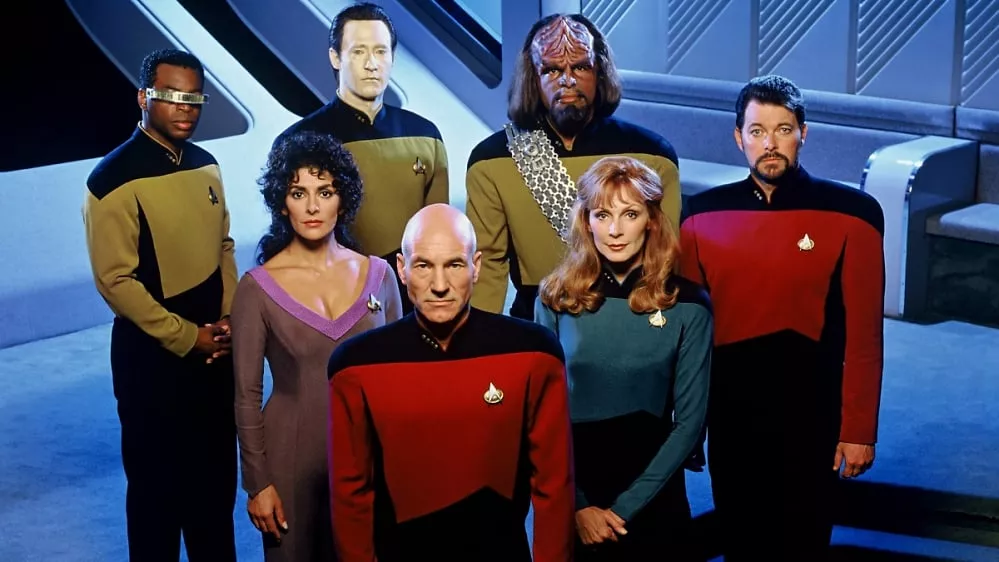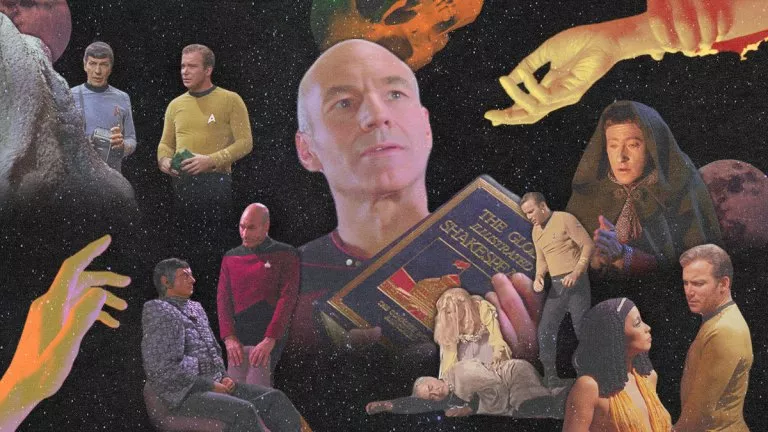Gene Roddenberry envisioned Star Trek as a space-age utopia characterized by idealism, intelligence, and a pursuit of peace and prosperity. He aimed to create a show that would exemplify the finest qualities of humanity, tackling contemporary issues while serving as an inspirational model for society. To achieve this, Roddenberry drew inspiration from stories that were centuries old, building upon their themes and ideas to transport viewers 300 years into the future.
Roddenberry, who gained experience writing for early Westerns and police procedurals, aspired to transcend the boundaries of typical genre television with his science fiction series. He aimed to capture the attention of intellectuals, although he may have excelled a little too much in that regard, as the original pilot of Star Trek, titled “The Cage,” was initially rejected for being “too cerebral.” To appeal to the thoughtful audience, Roddenberry incorporated an extensive range of literary influences, akin to a vast library of knowledge.
From the outset, classic literature played a pivotal role in Roddenberry’s initial pitch. Captain Kirk was likened to Horatio Hornblower, embodying a courageous and noble figure, while the overall concept of the show drew parallels to the narrative of Gulliver’s Travels set in space. In subsequent series, such as Star Trek: The Next Generation, Roddenberry expanded his literary influences even further, weaving in elements from the works of Raymond Chandler, Sherlock Holmes, and Mark Twain.
However, the most profound and enduring influence on Star Trek can be attributed to the renowned playwright William Shakespeare. Shakespeare’s works have served as an integral and foundational part of the franchise since its inception.
Shakespearean Threads Woven into Star Trek’s Fabric
The inaugural episode of the original series’ first season, “The Conscience of the King,” not only derives its title from a line in Hamlet but also adopts its plot from the timeless play. Captain Kirk finds himself embroiled in a quest to uncover a potential murderer while observing a theater troupe’s renditions of Macbeth and Hamlet. In the second season’s “Catspaw,” inspiration is drawn from Macbeth as the Enterprise crew encounters three chanting witches, a medieval castle, and a distinctly Lady Macbeth-like antagonist. Season three’s “Elaan of Troyius” weaves a tale reminiscent of The Taming of the Shrew, intermingled with echoes of Helen of Troy from the Iliad.
Even the very name of the USS Enterprise may have been influenced by a line from Julius Caesar: “The heavens speed thee in thine enterprise!” According to the story, Roddenberry initially contemplated naming the starship the Yorktown but had an abrupt and inexplicable change of heart. Considering the numerous Shakespearean allusions throughout the series, it is improbable that he was not familiar with such an exceptionally fitting quote.
The Shakespearean influence extended beyond the writing and creation of Star Trek, as the cast was adorned with actors well-versed in the bard’s works. William Shatner, renowned for his theatrical background during the original series’ debut, was equally known for his stage accomplishments. Some theories propose that his distinctive acting style may have been a remnant of his time on the stage, where more exaggerated gestures were customary.

Shakespearean Thespians and the Soul of Star Trek
The Star Trek films introduced esteemed Shakespearean actors Christopher Plummer and David Warner in Klingon roles, even suggesting that Shakespeare himself was a Klingon warrior. In Star Trek: The Next Generation, we were graced with Patrick Stewart, a prominent member of the Royal Shakespeare Company and the epitome of a Trek actor synonymous with the bard. Kate Mulgrew transitioned from Shakespeare in the Park to commanding the USS Voyager. Surprisingly, Deep Space Nine boasts the most Shakespearean actors on-screen simultaneously: René Auberjonois (Odo), Avery Brooks (Captain Sisko), and Armin Shimerman (Quark), all having trod the theatrical boards at one point or another. In fact, Alexander Siddig (Dr. Bashir) once remarked that the DS9 cast had performed more Shakespeare than he had consumed hot dinners.
However, Shakespeare’s influence on Star Trek reaches even deeper. The timeless truths and transcendental themes explored in his works are intricately woven into the very essence of the show. Unlike the hero’s journey depicted in Star Wars, the Star Trek franchise has consistently delved into philosophy, ethical dilemmas, and contemplations of the human spirit—the same profound examinations that keep Shakespeare relevant.
Consider the episode “Obsession” from the original series’ second season. While it revolves around battling a blood-sucking cloud creature, it also delves into Captain Kirk’s personal obsession and guilt. These are subjects that Shakespeare tackled in plays like Othello, Macbeth, and Richard III, where human frailties and moral complexities take center stage.
And this discussion of Shakespeare is far from mere speculation. In “The Defector,” an episode from season three of The Next Generation, Picard makes this sentiment explicit. Portrayed by Patrick Stewart, who takes on the roles of both captain and holodeck soldier, Picard guides Data (Brent Spiner) through a scene from Henry V. When Data falters, Picard advises him, stating, “Your purpose here is to gain insight into the human condition, and there is no superior method than immersing yourself in Shakespeare.”
Indeed, the more recent iterations of Star Trek have not been as saturated with Shakespearean references as the original series or The Next Generation. Even Picard himself mostly restrained his Shakespearean inclinations until the climactic moments of the finale. However, as evidenced by the now-famous “Hamlet, hell yeah!” quote from Discovery’s Michael Burnham (Sonequa Martin-Green), the Bard’s influence on Star Trek remains an indelible part of the franchise, no matter how far-reaching its voyages may be. By bridging the finest elements of the future with the timeless treasures of the past, Gene Roddenberry established an unbreakable connection across the entirety of humanity, charting a course for the Enterprise and all the starships that would follow.
